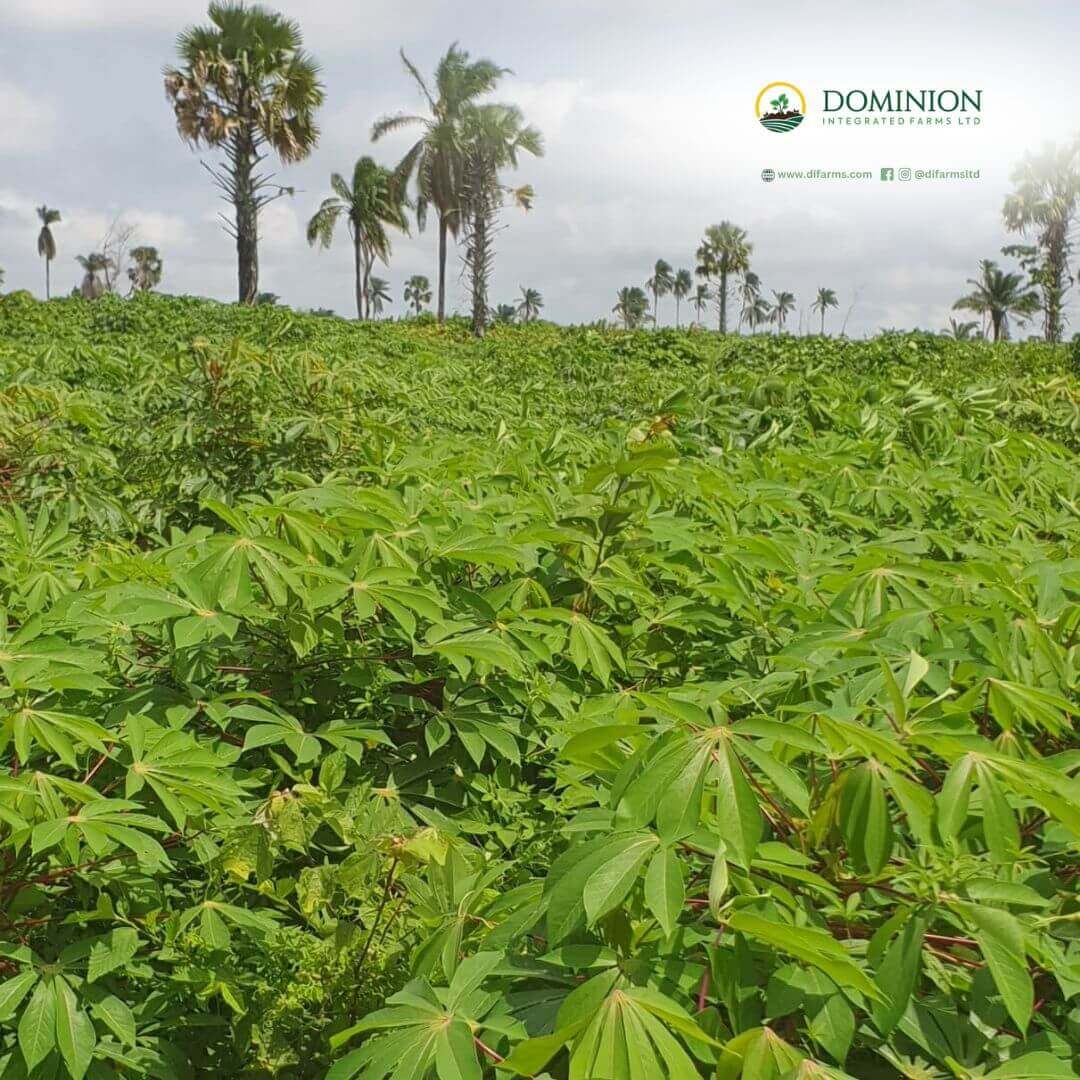
Cassava is one of Nigeria’s most important staple crops, feeding over 200 million people and supporting thousands of agribusinesses across the country. Yet, despite Nigeria being the world’s largest producer of cassava, many farmers still rely on manual farming methods that limit productivity and profits.
The game is changing. With mechanized cassava farming in Nigeria, farmers can now plant, weed, and harvest faster, reduce labor costs, and achieve higher yields. At Dominion Integrated Farms Limited, we have embraced mechanization to boost efficiency and meet the growing demand for cassava and its by-products.
Why Mechanized Cassava Farming is the Future
Mechanization goes beyond replacing hoes and cutlasses with tractors. It’s about transforming farming into agribusiness by using modern tools and techniques that:
-
Reduce time spent on land preparation and planting.
-
Increase the number of hectares farmed.
-
Improve yield quality and consistency.
-
Attract investors by showing scalability and efficiency.
In Kogi and Benue States, mechanized cassava farms have reported up to 40% higher yields compared to traditional manual farming.
Key Stages of Mechanized Cassava Farming in Nigeria
1. Land Preparation
Traditionally, farmers use hoes and cutlasses to clear land. With mechanization, tractors and bulldozers handle:
-
Bush clearing
-
Ploughing
-
Harrowing
-
Ridging
This ensures uniform soil structure, better aeration, and improved root development.
2. Planting Cassava with Machines
Instead of bending over for hours to plant cassava stems manually, mechanized planters allow farmers to:
-
Plant faster and more uniformly.
-
Cover several hectares in a day.
-
Reduce labor costs significantly.
3. Weed and Pest Control
Mechanized cassava farming uses boom sprayers and herbicide applicators for efficient weed and pest management. This reduces crop competition and improves cassava growth.
4. Harvesting Cassava with Machines
Manual harvesting is backbreaking and time-consuming. With mechanized harvesters:
-
Cassava roots are lifted from the soil with minimal breakage.
-
Large fields can be harvested within days instead of weeks.
-
Post-harvest losses are minimized.
Dominion Integrated Farms uses mechanized harvesters in Kogi State, ensuring faster supply to food processors and markets.
Benefits of Mechanized Cassava Farming in Nigeria
Mechanization provides measurable advantages that make cassava farming more profitable:
-
Higher Yields: Mechanized farms often record 25–40% more harvests than manual farms.
-
Time Efficiency: A tractor can plough a hectare in hours, compared to days with manual labor.
-
Labor Savings: Reduces dependence on scarce farm workers.
-
Consistency: Produces uniform cassava suitable for processing into garri, starch, ethanol, and flour.
-
Commercial Viability: Large-scale operations attract processors and export buyers.
Real-Life Example: Dominion Integrated Farms’ Mechanized Cassava Operations
At Dominion Integrated Farms, we’ve invested in tractors, planters, and harvesters to scale cassava production in Kogi State. Using modern equipment, our farms produce high-quality cassava roots for food processors, ethanol producers, and local markets.
Our experience shows that mechanized cassava farming is not just about technology—it’s about efficiency, sustainability, and food security in Nigeria.
Practical Tips for Nigerian Farmers Transitioning to Mechanization
Switching to mechanized cassava farming may seem challenging, but with the right approach, it becomes achievable:
-
Start small: Rent tractors and implements before buying.
-
Join cooperatives: Pool resources with other farmers to afford mechanization services.
-
Choose suitable land: Flat, well-drained land works best for mechanized operations.
-
Work with agribusiness partners: Farms like Dominion Integrated Farms can provide training and supply support.
-
Focus on markets: Align production with processors’ demand for starch, garri, or ethanol.
Challenges of Mechanized Cassava Farming in Nigeria
Despite the benefits, some challenges remain:
-
High cost of equipment (tractors, harvesters, planters).
-
Limited access to credit facilities for smallholders.
-
Poor rural infrastructure (roads, electricity).
-
Skill gaps in operating and maintaining machines.
However, with government support, private partnerships, and modern agribusiness models, these challenges can be overcome.
Future of Mechanized Cassava Farming in Nigeria
Mechanization is paving the way for agribusiness-driven cassava production. As Nigeria pushes for industrialization, cassava will play a key role in producing:
-
Garri and fufu for local consumption.
-
Starch and ethanol for industries.
-
Cassava flour as a wheat substitute.
Farmers and investors who embrace mechanization today will be leaders in Nigeria’s agricultural revolution.
Why Choose Dominion Integrated Farms
At Dominion Integrated Farms Limited, we:
-
Use modern mechanized systems for cassava cultivation.
-
Supply fresh, high-quality cassava roots to buyers across Nigeria.
-
Offer agribusiness training and consulting for investors.
-
Support food security and sustainable farming in Nigeria.
Visit https://difarms.com today or contact us to learn more about cassava farming, partnership opportunities, and fresh cassava sales.